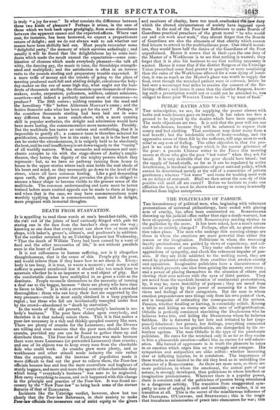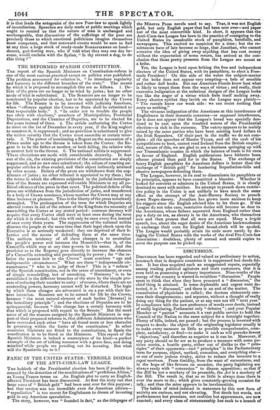THE POLITICIANS OF PASSION.
THE inconsistency of political men, who, beginning with vehement protestations of universal philanthropy, have ended with glaring acts of cruelty, has often been commented on. ROBESPIERREI throwing up his judicial office rather than sign a death-warrant, has been eloquently contrasted with ROBESPIERRE sending victims to the guillotine by the score. It has been asked, how a man's nature could be so entirel.% changed ? Perhaps, after all, no great altera- tion takes place. The men who undergo this seeming change are those in whom the emotions are more powerful than either the reason or the imagination. Politicians in whom the reasoning faculty predominates are guided by views of expediency, and cal- culate the means of success. They make allowance for the ex- aggerations of sympathy, and check the vehement impulse of pas- sion. If they are little addicted to the melting mood, they are saved by prudential reflections from cruelties that awaken enmity and opposition. Imaginative politicians have a discursiveness of mind which prevents one idea from gaining the mastery over them ; and a power of placing themselves in the situation of others and viewing their ()an actions with the eyes of third parties. They are saved from the mawkish iteration of sentimental protestations, by, it may be, mere instability of purpose ; they are saved from excesses of cruelty by their power of assuming for a time the views and feelings of their antagonists. But the man in whom emotion preponderates sees things only from his own point of view, and is incapable of estimating the consequences of his actions. Passion, whether fondling or hurting, is essentially selfish. Kissing a bride and killing an enemy are alike acts of self-gratification. Othello is perfectly consistent cherishing the Desdernona who he believes loves him, and killing the Desdemona whom he believes faithless. He is flattered by her love and irritated by her (sup- posed) falsehood : her person, her feelings, everything connected with her extraneous to his gratification, are disregarded by his re- lentless egoism. The man Othello is the type of the passionate politician. He cares for the wretched only in so far as they excite in him a pleasurable emotion—afford him an excuse for self-admir- ation. His hatred of oppressors is in truth the pleasure he takes in an emotion which urges him on to struggle and conquer. His sympathies and antipathies are alike selfish : whether lamenting over or inflicting injuries, he is consistent. The importance of these truths is not limited to the aid they lend us in unriddling the character of a ROBESPIERRE. As there are more men, so there are more politicians, in whom the emotional, the animal part of our nature, is strongly developed, than politicians in whom intellect or imagination predominates. Wherever there is a popular power, there is constant risk of the politicians of passion being stimulated to a dangerous activity. The transition from exaggerated sym- pathy to acts of cruelty is swift and insensible; or rather, it is no transition at all. This is the secret of the mischievous influence of the OASTLERS, O'Corixons, and STEPHENSES ; this is the magic that transforms missionaries of peace into clamourers for war ; this it is that leads the antagonist of the new Poor-law to speak lightly of incendiarism. Speeches are daily made at public meetings which ought to remind us that the nature of man is unchanged and unchangeable, that discussions of the sufferings of the poor are precisely those to which emotional politicians imagine themselves most competent, and that untoward events would be sure to find at any time a large stock of ready-made ROBESPIEHRES on band— decent, god-fearing men, who if told what they may one day be- come, would exclaim with the Syrian, "Is thy servant a dog, to do this thing ?"



























 Previous page
Previous page